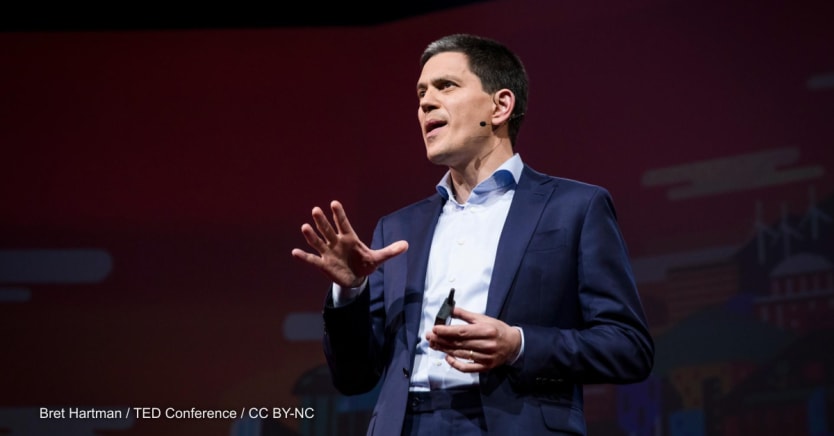
The international community has a “starvation policy” towards Afghanistan, according to former U.K. Foreign Secretary David Miliband, who laid out a series of steps he believed would solve what he called a relatively “straightforward” crisis.
U.S. President Joe Biden and U.K. Prime Minister Boris Johnson said in August 2021 that “military withdrawal [from Afghanistan] would not be followed by political, humanitarian and economic withdrawal, but in fact it has,” leading to ordinary people “paying the price of the peace,” said Miliband, who now leads the International Rescue Committee, an NGO.
Following its takeover by the Taliban in August 2021, Afghanistan now faces a major economic and food security crisis, with more than 22 million people dependent on the World Food Programme to eat. Meanwhile, billions in financial assets belonging to the Afghan state have been frozen in the United States, Europe, and the Gulf, which campaigners are calling to be released to ease the country’s economic troubles.
“Afghans have paid a very high price of war. Now Afghans are paying the price for peace, and that’s something that is indefensible,” Miliband told a Chatham House event, in comments echoing those of other former senior U.K. officials.
The U.K. government announced Tuesday it would co-host a United Nations pledging summit to help the organization raise the $4.4 billion it says it needs to meet the humanitarian crisis in Afghanistan.
Get the inside track on how agriculture, nutrition, sustainability, and more are intersecting to remake the global food system in this weekly newsletter.
Miliband cited a meeting he held with Afghan IRC staff who told of the extreme poverty and dysfunction facing health care centers. A large proportion of female nurses he spoke with also faced domestic gender-based violence, added Miliband.
To “stop the starvation” in the country, Miliband made a series of suggestions: that the World Bank pay the salaries of public sector workers through the Afghan Reconstruction Trust Fund, that the United States and its allies “clarify that the sanctions that exist … apply to 147 Taliban individuals, not to the state institutions over which they stand at the top of,” and that “capital and liquidity” should be injected into the Afghan banking system to get the economy running. Finally, “you have to stand up a central bank and a finance ministry function,” said Miliband.
Raab: UK could withhold aid to Afghanistan to hold Taliban to account
While politicians from various parties have suggested increasing aid and planning to help Afghans, Foreign Secretary Dominic Raab suggests the U.K. aid budget could be withheld to hold the Taliban to account.
“All those four things can be done without getting into the recognition issue,” he added, referring to the current political impasse over whether governments should officially recognize the extremist Taliban as the legitimate government of Afghanistan.
Miliband said he had been told by experts inside Afghanistan that there was “scope” for some kind of international supervision or auditing of the banking system.
Compared to other humanitarian crises in Ethiopia, Yemen, Somalia, dealing with the crisis in Afghanistan “is actually pretty straightforward,” said Miliband. “This is not very complicated … [to stop a starvation crisis] it’s not actually a very complex set of policy issues.”
While recognition of the Taliban was a highly contentious political issue, Miliband said there should also be “recognition of reality … they won the war, we lost the war … we can’t micromanage the country from thousands of miles away.”
“Let’s not blind ourselves to the balance of power that exists in the country and let’s take our lead from Afghans about what they need, they need to get over the starvation crisis and they need to then have some opportunity to forge their own future,” he said.
Miliband linked the crisis in Afghanistan to broader geopolitical “system failure,” of which a major factor was the “internationalization of civil conflict.”
“What’s happening in the world’s war zones … is the tip of the iceberg,” he said. “And the issues of impunity, of balance of power, of neglect in the world’s global public commons are acute in those conflict places but they are present elsewhere too.”









